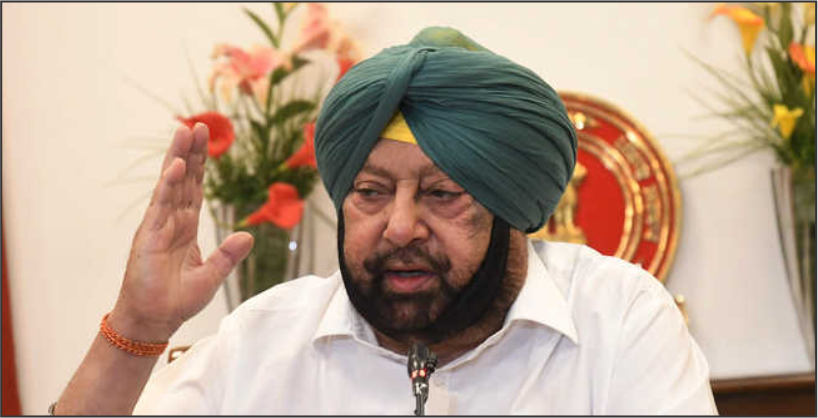Also Approves Utilisation Of Finance Commission Grant Funds For Tap Water Connections In Rural Households
The Punjab Cabinet led by Chief Minister Captain Amarinder Singh on Wednesday approved the implementation of Swachh Bharat Mission (Gramin) (SBM-G) Phase II across the state, in convergence with 15th Finance Commission Grants (FCG), MGNREGA and other Central/State sponsored schemes, while approving utilisation of FCG funds for universal coverage of rural households with Functional Household Tap Connections (FHTCs) under the Jal Jeevan Mission.
The Cabinet also gave in-principle approval for arrangement of matching State Share for sanctioned projects, from RDF, RIDF or any other State Government schemes/sources, in case of any shortage of funds, for SBM-G and for achieving the target of universal coverage of 100% rural households with Functional Household Tap Connections (FHTCs) by March 2022.
According to a spokesperson of the Chief Minister’s Office, in line with the state government’s community focus for the scheme, the Swachh Bharat Mission (Gramin) Phase II, would ensure involvement of the Community at every stage, starting from asset creation to its operation & maintenance.
Referring to the funding pattern of Swachh Bharat Mission (Gramin) – a Centrally Sponsored Scheme with 60:40 fund sharing pattern between Centre and States, the spokesperson said that the Ministry of Panchayati Raj, Government of India, vide its letter dated March 6, 2020, had communicated that the 15th Finance Commission, in its interim report, has recommended a grant of Rs. 60,750 crores for the entire country (FY 2020-2021) to all the three tiers of Panchayats.
The grants would be split under two components – (i). Basic Untied having 50% of the basic untied grant available for location-specific needs, except salary, or establishment expenses and (ii) Basic Tied with 50% of the basic tied grant availability of basic services of sanitation & maintenance of ODF Status, along with supply of drinking water, rainwater harvesting and water recycling.
Funds to the tune of Rs. 260 crore approximately would be allocated in Financial Year 2020-21 by the Rural Development & Panchayats Department solely for sanitation activities, to be taken up in the village Panchayats, in compliance with the directions of the Ministry of Panchayati Raj, Government of India regarding utilisation of the 15th Finance Commission Grants.
The Government of India had directed the State Government to submit Project Implementation Plan 2020-21 to 2024-25, and Annual Implementation Plan for 2020-21, for release of grant-in-aid for Swachh Bharat Mission (G) Phase II.
Swachh Bharat Mission (G) Phase II aims to further enhance the sanitation and hygiene status in rural India through community participation. It is aimed at ensuring that the Open Defecation Free (ODF) status of the State is sustained, and villages are provided with adequate solid and liquid waste management facilities.
Notably, the Government of India has identified certain activities to be carried out in the villages for availing the 15th Finance Commission basic tied grants under sanitation component during financial year 2020-21.
In order to complete the 100% FHTCs in rural habitations, funds to the tune of Rs. 660 Crore are required. Since, the JJM scheme is based on 50:50 sharing pattern Rs. 330 crore shall be met from JJM funds and Rs. 330 crore shall be the State share. Of the Rs. 330 crore of State share, Rs. 150 cr are available under the World Bank funded Punjab Water Supply and Sanitation Improvement Project (PRWSSIP) upto March 31, 2021. There shall be an additional requirement of Rs 180 Cr over the next two years from state resources, which can be met by dovetailing with the 15th Finance Commission grants (out of the tied funds for water supply)and in addition, by seeking funds under RIDF from NABARD or RDF. This shall include both new schemes as well as augmentation/retro-fitting of existing schemes, according to the spokesperson.
The grants to be released under the 15th Finance Commission to PRIs are tied for water related activities to the extent of 25% as per instructions issued by the Ministry of Panchayati Raj, GoI, vide its letter of March 6, 2020, although there is no limit to use of untied funds (50%) for completion of water related activities including coverage of remaining FHTCs.
As for financial requirements of the Surface water projects, funding of Rs 1264 Crore has already been tied up from funds of JJM/WB/NABARD, of which 80% shall be spent by March 2022. For undertaking retro-fitting and short term mitigation measures in water quality habitations, the Department of Water Supply & Sanitation (DWSS) will require Rs 116 Crore, of which Rs 61 Crore as State share has to be provided by the Government.
Since the Department aims to converge all available funds under the existing schemes and projects to achieve Har Ghar Pani by March 2022 and intends to seek balance state share under RIDF and RDF, it shall submit its specific proposal to the Departments of Finance, Rural Development and Agriculture at appropriate time of implementation.
Notably, the Department of Water Supply and Sanitation (DWSS) has already provided piped water supply in 11399 villages (94.75%) and 50% of households are covered with FHTCs. Out of the remaining 17.59 lac households without connections, it is assumed that many of them are already receiving water supply in their houses either from the department piped water supply schemes although they are not regular or some of them have developed their own sources (private or even common submersible pumps). In order to cover the remaining 17.59 lacs households, DWSS has formulated an action plan to cover these remaining households with FHTCs in 2020-21 and 2021-22.

